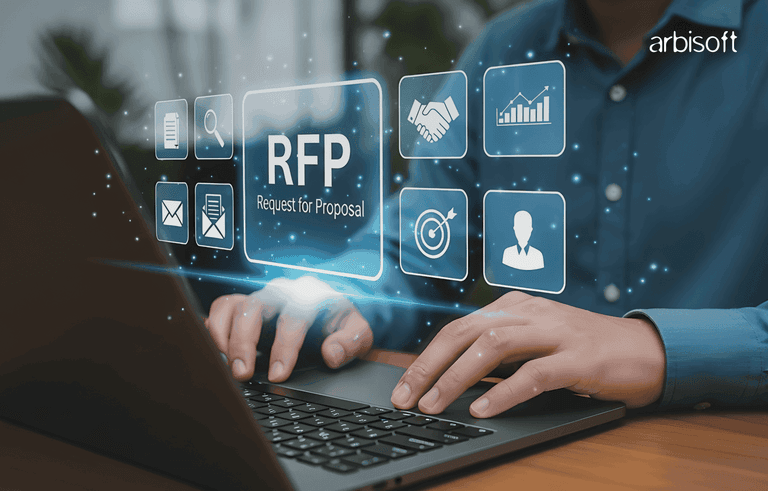We put excellence, value and quality above all - and it shows




A Technology Partnership That Goes Beyond Code

“Arbisoft has been my most trusted technology partner for now over 15 years. Arbisoft has very unique methods of recruiting and training, and the results demonstrate that. They have great teams, great positive attitudes and great communication.”
How SearchGPT May Use Machine Learning to Enhance Online Search

For decades, search algorithms have dominated our online experience, often leaving us overwhelmed with endless scrolling - which has become the norm!
Imagine searching for the perfect recipe, only to be bombarded with irrelevant links and endless scrolling. What if there was a smarter way to find exactly what you're looking for?
But what if there was a better way?
Enter SearchGPT, an innovative search engine prototype developed by OpenAI.
Unlike traditional search engines, which rely heavily on keyword matching, SearchGPT uses advanced ML techniques to understand the context and nuance behind user queries. OpenAI believes this could represent a revolutionary shift in how we interact with information online.
Linking its success and performance largely on ML - let’s explore what this dynamic duo is bringing to the table together!
Why SearchGPT?
SearchGPT - being the most direct challenge yet to Google - promises to redefine how we interact with information by leveraging the power of large language models. By moving beyond keyword-based searches and focusing on understanding user intent, SearchGPT claims to deliver more relevant, comprehensive, and informative results.
If successful, SearchGPT - a model developed in partnership with the publishers who have reached a deal with OpenAI (WSJ, AP, Vox Media) could revolutionize the search industry, challenging the dominance of Google in many ways! Though SearchGPT is just a “prototype” for now. The service is powered by the GPT-4 family of models and is only accessible to 10,000 test users for now.
ML and Online Search
ML is the core of SearchGPT's ability to revolutionize online search. By using the smart technology of ML, SearchGPT can deliver unprecedented levels of user experience, business insights, and competitive advantage. Here are a few ways this collaboration can benefit business at large.
1. Understanding User Intent
SearchGPT uses advanced ML algorithms to explore beyond surface-level keywords. It understands the subtle nuances of user queries, providing highly relevant and personalized results.
2. Improved Search Ranking
SearchGPT's ranking algorithm, potentially improved by techniques like RLHF, is fueled by ML, constantly learning and adapting to deliver the most relevant results. This data-driven approach ensures that businesses maintain a strong online presence and reach their target audience effectively.
3. Personalization at Scale
ML algorithms will enable hyper-personalized search experiences for SearchGPT by tailoring results to individual users based on their preferences, behavior, and context.
SearchGPT Powered by ML
SearchGPT is claimed to be a powerful AI-powered search engine with real-time access to information across the internet. It also claims to have the ability to process and understand human language at an unprecedented level. This makes it ideally suited to use ML for enhanced search capabilities.
Here's how SearchGPT can utilize ML to improve various aspects of online search.
1. Natural Language Understanding (NLU)
SearchGPT leverages NLU to break down complex queries into meaningful components, recognizing the relationships between words and phrases. For instance, if a user searches for 'best ways to prevent data breaches in healthcare’, NLU helps the system understand the specific context (data breaches) and industry focus (healthcare), even if the query is not perfectly structured. Some of the ways it can help include:
- Improved query interpretation - SearchGPT can use NLU to break down complex queries into their constituent parts, understanding the relationships between words and phrases.
- Multilingual capabilities - NLU can allow SearchGPT to understand and respond to queries in multiple languages, making search more accessible to a global audience.
2. Information Retrieval
ML algorithms underpin SearchGPT's ability to sift through vast datasets of text and code, identifying patterns and drawing connections between user queries and relevant web pages. For instance, if someone searches for 'renewable energy advancements,' the algorithms can prioritize recent, credible articles and studies, offering the most current and accurate information available. A few ways it can benefit include:
- Enhanced Search Algorithms - ML helps SearchGPT find patterns in large amounts of text and code, improving the accuracy and relevance of search results.
- Fact-Checking and Verification - SearchGPT uses ML to check the credibility of information sources, helping to flag false or misleading content.
- Discovering Hidden Information - ML enables SearchGPT to find unexpected connections in data, uncovering new insights and information.
- Semantic Search - By understanding the meaning behind words, SearchGPT can provide more accurate results for related queries.
3. User Experience
By leveraging historical user behavior and patterns, SearchGPT can anticipate user needs, offering relevant suggestions before the query is fully typed. For example, if a user frequently searches for 'weather in New York,' the system can preemptively offer updated weather forecasts as soon as 'wea...' is typed. Here are a few ways it can benefit.
- Predictive Search - SearchGPT claims to anticipate what users are looking for and suggest results before they finish typing, based on their behavior and search patterns.
- Voice Search - SearchGPT can understand spoken queries, making it easy to search using natural language.
- Interactive Search - SearchGPT can work with chatbots or virtual assistants, allowing users to have conversations to find the information they need.
- Visual Search - Users can search using images, with SearchGPT recognizing and analyzing the content of the pictures.
- Personalized Recommendations - SearchGPT can suggest products, services, or content tailored to a user's interests and preferences.
Potential Applications
The potential applications of SearchGPT and ML are vast and far-reaching. Some potential use cases include:
- E-commerce - Personalized product recommendations, visual search for fashion items, and intelligent product discovery.
- Healthcare - Medical information retrieval, drug discovery, and patient data analysis.
- Financial services - Fraud detection, investment analysis, and personalized financial advice.
- Education - Education - Intelligent tutoring systems, personalized learning, and educational content discovery, powered by modern education technology.
Preparing Your Business for a SearchGPT-Dominated World
The rise of SearchGPT presents both challenges and opportunities for businesses. Here's how you can position your business for success in this new search environment.
1. Focus on High-Quality Content and User Experience
- Develop content that is informative, engaging, and genuinely helpful to your target audience. SearchGPT is likely to prioritize content that delivers real value.
- Ensure your website is easy to navigate, loads quickly, and is mobile-friendly. A positive user experience is crucial for ranking well in any search engine, including SearchGPT.
- As voice search becomes more prevalent, optimize your content for conversational queries.
2. Understand and Leverage User Intent
- Go beyond traditional keyword research and consider how the future of SEO is shifting toward intent-based optimization.
- Address specific questions and pain points your target audience has.
- Tailor your content and marketing messages to individual users based on their preferences and behavior.
3. Build Strong Brand Authority
- A strong brand reputation is essential for standing out in a competitive search landscape.
- Positive feedback can significantly boost your credibility.
- Position your business as an expert in your industry through blog posts, articles, and industry speaking engagements.
4. Measure and Adapt
- Monitor your website's performance and adjust your strategies accordingly.
- Analyze and gather data on how your content performs in SearchGPT to identify areas for improvement.
- Stay agile and be prepared to adapt your strategies as needed as this develops further.
In The End
SearchGPT with the power of ML, has the potential to revolutionize how we search for and consume information. By understanding user intent, providing relevant results, and delivering personalized experiences, SearchGPT can significantly enhance user satisfaction and productivity. The official announcement of SearchGPT is probably giving Google and AI-search startup Perplexity plenty of headaches. Google has been preparing for this moment by bringing AI summaries to its search engine and peppering the tech across the Search ecosystem.
However, addressing the challenges of data quality, bias, explainability, and the monetization of AI search will be crucial for realizing its full potential. All eyes are on OpenAI as the testing phase rolls out!
























